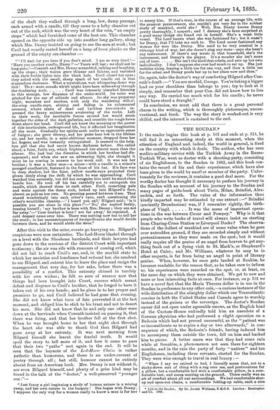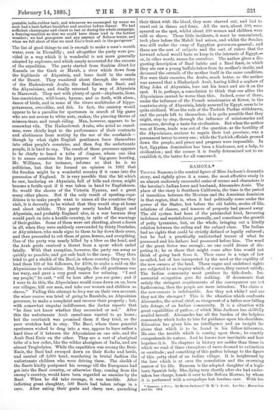THE SOUDAN" Ir the reader begins this book at p.
101 and ends at p. 314, he will find it an interesting study at this moment, when the attention of England and, indeed, the world in general, is fixed on the country with which it deals. The author, who has seen
medico-military service with the Turkish Army in the RussoTurkish War, went as doctor with a shooting-party, consisting
of six Englishmen, to the Soudan in 1882, and this book contains the record of his and their experiences, which have also been given to the world by anotl-er member of the party. Unfortunately for the reviewer, it contains a good deal more. For the worthy doctor has thought it necessary to preface his journey in the Soudan with an account of his journey to the Soudan and many pages of guide-book about Turin, Milan, Brindisi, Alex andria, and so forth. The value of the information thus kindly imparted may be estimated by one extract :—" Brindisi (anciently Brundusium) was, if I remember rightly, the birth
place of Virgil It was the scene of important operations in the war between Caesar and Pompey." Why is it that people who write books of travel will always insist on starting from Charing-Cross Station or Liverpool Docks P The observations of the dullest of mankind are of some value when he goes over nntrodden ground, if they are recorded simply and without pretentiousness as they were made on the spot; but it would really require all the genius of an angel from heaven to get anything fresh out of a flying visit to St. Mark's, or Shepheard's Hotel at Cairo ; and Mr. Williams, whatever he may be in other respects, is far from being an angel in point of literary genius. When, however, he once gets landed at Suakim, he becomes readable, for the reason that, as he takes care to inform us, his experiences were recorded on the spot, or, at least, on the same day on which they were obtained. We get to new and
more or less interesting facts at once. For instance, on p. 101 we have a novel fact that the Maria Theresa dollar is in use in the Soudan in preference to any other coin,—a curious instance of the wide distribution of the almighty dollar which our Transatlantic cousins in both the United States and Canada agree to worship
instead of the guinea or the sovereign. The doctor's Soudan career did not open under agreeable omens, as the English head of the Custom-House unkindly told him an anecdote of a
German physician who had performed a slight operation on a Bedouin which had not proved successful, as the "patient was so inconsiderate as to expire a day or two afterwards," in consequence of which, the Bedouin's friends, having induced him to accompany them outside the town, fell on him and hacked him to pieces. A better omen was that they had some rain while at Souakim, a phenomenon not seen there for eighteen months, and in the rain the party of forty " natives " and ten Englishmen, including three servants, started for the Soudan. They were wise enough to travel in real luxury : —
" When I say we retired to bed, I literally mean that, not to a shake-down sort of thing with a rug over me, and portmanteau for a pillow, but a comfortable bed with a comfortable pillow, in a comfortable tent, and cocoa matting on the ground. There really was an air of comfort about all our surroundings. We had comfortable shutup and open-out chairs, a comfortable folding-up table, each a nice portable india-rubber bath, and whenever we encamped by water we each bad a bath before breakfast and another before dinner. We had sufficient champagne and claret to last us during the whole campaign, a freezing-machine so that we could have these iced in the hottest weather; we had gazogenes and any amount of Seltzer-water, and when we fell short of that we used Eno's fruit-salt in the gazogenes."
The list of good things to eat is enough to make a man's month water, even in Piccadilly ; and altogether the party were provided in a way which it is wonderful is not more generally adopted by explorers, and which amply accounted for the success of the expedition. The party started from Suakim direct for Kassala on the Gash or Marab, a river which flows from the highlands of Abyssinia, and loses itself in the sands of the Desert. They wandered about through the country of the Hadendowah Arabs, the Beni-Emir, the Base, and the Abyssinians, and finally returned by way of Abyssinia to Massowah. They met with plenty of sport—elephants, lions, boa-constrictors, wild-boars, hyenas, and so forth, with abun-,
dance of birds, and in some of the rivers multitudes of hippopotamuses, crocodiles, and fish. In fact, the country would appear to be a paradise for sportsmen in search of big game
who are not averse to white ants, snakes, the piercing thorns of mimosa-trees, and rough riding. Man, however, appears to be somewhat vile. The Hadendowah Arabs, who acted as camel men, were chiefly kept to the performance of their contracts and abstinence from mutiny by the use of the courbatch though by what right English gentlemen force themselves into other people's countries, and then flog the unfortunate people, it is hard to say. The result of these processes appears to be chiefly to breed a tribe of Jingoes, whose one idea is to annex countries for the purpose of big-game hunting. Mr. Williams, for instance, informs us that he is no politician, but that he formed an opinion in 1882 that the Soudan might be a wonderful country if it came into the possession of England. It is very possible that the bit which he saw, bordering on Abyssinia, fall of hills and rivers, might become a fertile spot if it was taken in hand by Englishmen.
So would the shores of the Victoria Nyanza, and a great many other places. But if the only result of sporting expe ditions is to make people want to annex all the countries they visit, it is devoutly to be wished that they would stop at home and shoot rabbits. This party nearly landed Egypt and Abyssinia, and probably England also, in a war because they would push on into a hostile country, in spite of the warnings of their guides. Some of them were out shooting, about a dozen in all, when they were suddenly surrounded by thirty Dunbelas, or Abyssinians, who made signs to them to lay down their arms, and then proceeded to rob them of guns, horses, and everything. One of the party was nearly killed by a blow on the head, and the Arab guide received a thrust from a spear which ended fatally. With that exception, however, the party ran away as quickly as possible, and got safe back to the camp. They then tried to get a sheikh of the Base, in whose country they were, to lend them 100 of his followers, for £100, to make a raid on the Abyssinians in retaliation. But, happily, the old gentleman was too wary, and gave a very good reason for refusing. "I and
my people," he said, " will be here after you are gone; and if I were to do this, the Abyssinians would come down on us, burn our villages, kill our men, and take our women and children as slaves." Failing this attempt to levy war on their own account, the wiser course was tried of going to Rasalulu, an Abyssinian governor, to make a complaint and recover their property ; but,
with somewhat singular indifference, the doctor reports that "he does not know whether they succeeded or not." After this the unfortunate Arab camel-men wanted to go home ; but the conrbatch was promised them if they tried, so the poor wretches had to stay. The Base, whom these peaceful sportsmen wished to drag into a war, appear to have rather a hard time of it between the Abyssinians on one side, and the Arab Beni-Emir on the other. They are a sort of aboriginal tribe of a low order, like the wilder aborigines of India, and are almost Troglodytes. While the expedition was among the Beni Emir, the Base had swooped down on their flocks and herds, and carried off 2,000 head, murdering in brutal fashion the unfortunate children who were driving them. The sheikh of the Bases kindly postponed his revenge till the Europeans had got into the Base country, or otherwise they, coming from the enemy's country, would have been regarded as enemies by the
Base. When he did take revenge, it was terrible. After inflicting great slaughter, 500 Bases had taken refuge in a
cave. After eating their' goats and sheep raw, quenching their thirst with the blood, they were starved out, and had to crawl out in threes and fours. All the men, about 300, were speared on the spot, whilst about 200 women and children were sold as slaves. These little incidents, it must be remembered, took place before the Mandi had arisen, and whilst the Soudan was still under the sway of Egyptian governors-general ; and these are the sort of subjects and the sort of rulers that the forward school would have us keep in the interests of Egypt,— or, in other words, annex for ourselves. The author gives a disgusting description of Base habits and a Base feast, in which they ate raw a young buffalo taken from its mother's inside, and devoured the entrails of the mother itself in the same condition. Nor were their enemies, the Arabs, much better, as the author was assured that a Shekariyah Arab, having killed a nephew of King John of Abyssinia, tore out his heart and ate it on the spot. It is, perhaps, a consolation to think that our allies the Abyssinians cannot be worse than this. Indeed, some of them, under the influence of the French missionaries at Keren, in the coastwise strip of Abyssinia, lately annexed by Egypt, seem to be quite civilised. Were the rule of the Turkish Pashas withdrawn, and the people left to themselves, it is quite possible that they might, step by step, through the influence of missionaries and commerce, develop a taste for civilisation. But when the author was at Keren, trade was out of the question, as the hostility of the Abyssinians, anxious to regain their lost province, was a permanent terror to every one ; while the Turkish officials ground down the people, and peace and progress were impossible. In fact, Egyptian domination has been a hindrance, not a help, to civilisation ; and the sooner it is finally determined not to reestablish it, the better for all concerned.



































 Previous page
Previous page